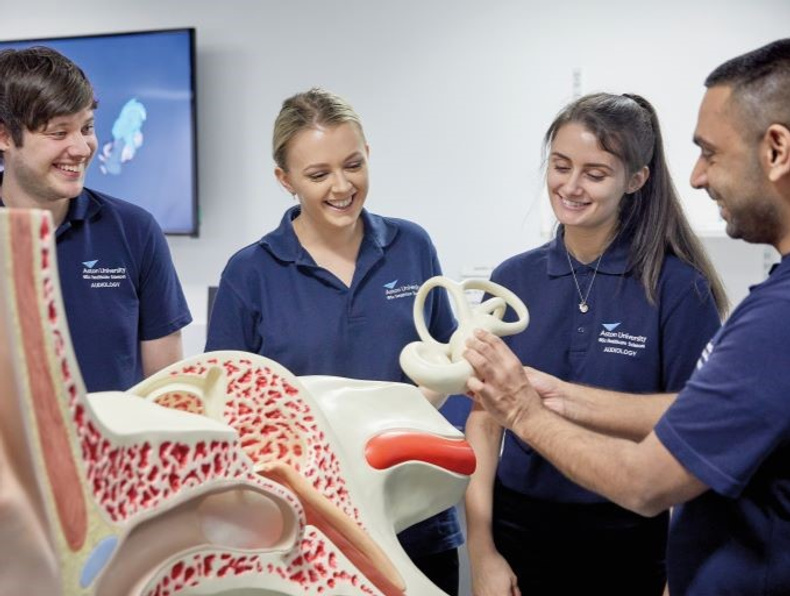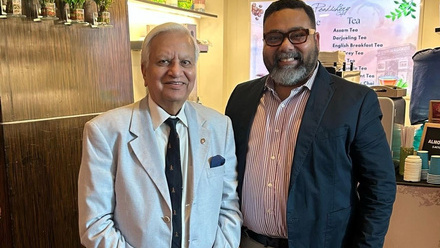University audiology department celebrates 20th anniversary

Aston University Department of Audiology and Healthcare Science is celebrating its 20th anniversary.
The Audiology department will host a celebration gathering for staff, students and alumni to mark the occasion.
Some of the alumni will give talks on where their Aston University qualifications have taken them.
The gathering will also be attended by invited guests from the NHS, the independent sector, manufacturers, charities, higher education and wider research fields.
Audiology and Healthcare Science is one of the largest audiology university departments in the UK, offering onsite audiology skills labs for students and state-of-the-art diagnostic and rehabilitative equipment and technology.
Students benefit from hands-on experience through patient clinics run onsite, including the the Specsavers patient clinic, which opened in 2022. Research at the department includes the psychosocial influences of chronic hearing conditions, shared decision-making in hearing and tinnitus care, and the causes and impact of hearing loss in childhood.
The first cohort of BSc (Hons) Audiology students began their studies in 2003. For the first time, the NHS funded audiology programmes in several UK universities, including for 25 students at Aston University. The students spent their third year in NHS placements and graduated in 2007.
In 2011, the UK government stopped NHS funding for audiology programmes, and while some universities stopped offering audiology courses, Aston University instead began to offer standard, self-funding courses – the current three-year BSc Healthcare Science in Audiology, included an integrated placement programme.
In 2023, 37 students enrolled on the course and there are now 97 students across the three years of the course.
In 2012, Aston University became one of only two in the UK to offer a scientist training programme (STP) in healthcare science, following a competitive bidding process.
The course encompassed the disciplines of neurophysiology, vision sciences and audiology, and has become the MSc in Clinical Science (Neurosensory Sciences).
Two more MSc courses followed in 2013 and 2016 – Neurophysiology, developed jointly by the audiology and neurophysiology teams, and Hearing Therapy.
In 2018, Aston Audiology began offering BSc Audiology (level 6) degree apprenticeships, which allow students to train on the job, as in a normal apprenticeship, graduating with a full degree at the end, and able to see both routine and complex adult and paediatric patients.
From 2024, the department will also offer level 5 degree apprenticeships, where those completing the course receive a foundation degree, qualifying them to work as hearing aid dispensers for routine adult cases.
As part of the celebrations, two of the department’s academics, Dr Helen Pryce and Dr Amanda Hall recorded a podcast reflecting on 20 years of audiology at Aston University, and the contribution the department has made to the field.
Dr Pryce said that one of the key strengths of Audiology at Aston University is the applied nature of its work and research, with the research feeding directly back into teaching and practice. Dr Hall is also a clinician at Bristol Children’s Hearing Centre and enjoys being able to take clinical problems, translate those into research questions for her academic role, and then take solutions back into clinic.
She says: “That’s the kind of project that I really love, working on something that I know is going to be directly helpful.”
Collaboration and partnerships with academics in other departments and schools within Aston University, such as psychology, and with NHS trusts, form an important part of the work at Aston Audiology.
Dr Hall and Dr Pryce agree that a strength of the department is the value it places on patient experience and improving their care, and partnerships with members of the public help to inform research programmes and results.
They also enjoy the broad range of teaching at the department, ranging from the degree apprentice students all the way to postgraduate. Students are hands on almost from day one, but the value of research is also instilled in them, creating rounded graduates well able to choose practice or academia. The department is still growing, throwing up new research questions all the time.
Dr Pryce said: “I’m really proud of the fact that we are the department in the whole of the country which provides the broadest range of training, and I think that’s really important. I think that we’re really special in that we absolutely integrate research and teaching.
"The nature of our research is such that students can really engage with it because it’s stuff that they’re really going to do, not stuff that they’re going to do when they’re senior or when they’re researchers themselves, but tomorrow, when they go back into practice.”
To listen to the podcast, visit the Aston Originals YouTube channel.
Head of department Professor James Wolffsohn said: “Audiology at Aston University is going from strength to strength, with innovative undergraduate and postgraduate programmes, high graduate employment, industry collaborations and a portfolio of grants and quality research publications.”
For more information about the department and its courses, visit the website.



